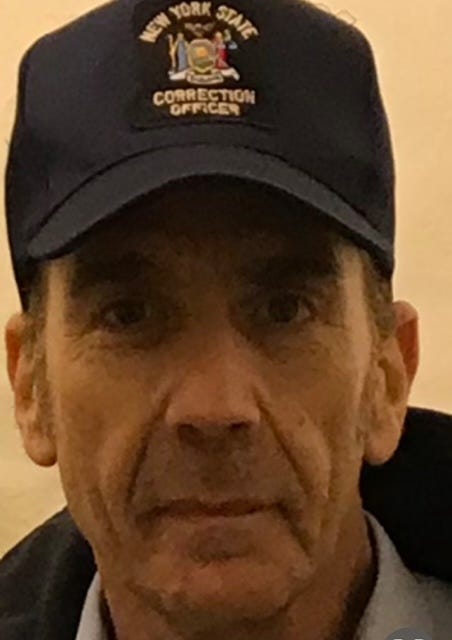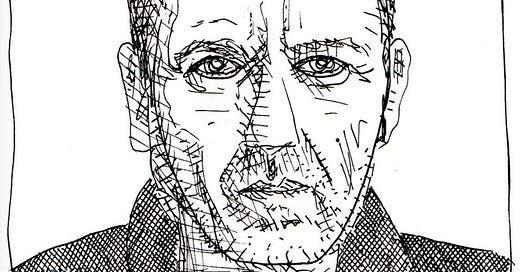Ask a Sober Oldster #11: Author Jerry Stahl
"In my old age, I have come to realize that everybody on the planet is recovering from something."
This monthly interview series is a collaboration between Oldster Magazine and The Small Bow, A.J. Daulerio’s excellent newsletter about recovery and mental health, and will appear in both newsletters. Learn more about this collaboration in this Oldster podcast/videocast episode.

Novelist, screenwriter, journalist, occasional actor & all-around guy who should be dead, Jerry Stahl is the author of ten books, including the bestsellers Permanent Midnight (made into a movie with Ben Stiller) and I, Fatty. His latest book, Nein, Nein, Nein! - One Man’s Tale of Depression, Psychic Torment and a Bus Tour of the Holocaust, was named one of the 100 best non-fiction books of 2022 by Kirkus Reviews, and has been optioned by Robert Downey. His screen-work includes CSI, Maron, HBO’s Hemingway and Gellhorn, Bad Boys 2, and most recently, Escape at Dannemora, for which he received an Emmy nomination. He has taught at San Quentin and Barry J. Nydorf Juvenile Hall.
—
How old are you, and how long have you been in recovery?
70, off the hard stuff since Clinton was in office.
How did you get there?
On my hands and knees. By the end, life had evolved – or devolved – into a kind of non-stop smack & crack binge. I would never call it a party, since I pretty much used drugs so I didn’t to have to hear your party. I was not one of those people who staggered into the Twelve Step world and found salvation. I relapsed early and often. After the last one, at around a year-and-a-half, it finally sunk in that being a dope fiend was pretty much the worst day job in the world. And I retired.
I don’t trust anybody who hasn’t been to hell. The difference is, without the dope or the drink, I’m not the degenerate who makes other people feel like they’re already living there. Which is also a terrific thing.
What are the best things about being in recovery?
One of the best things is when you realize, at some party, on a plane, or in the middle of some heinous professional confab, that the person next to you is in the same club you are. Sometimes it’s as simple as noticing that you two are the only ones not drinking. Sometimes it’s more mysterious: a look in the eye, or the unspoken sense that this stranger has been down the same kind of road you’ve been down. A connection probably not unlike that between Masons – minus the secret handshake. (Unless there is a secret handshake, and no one’s ever told me.)
I don’t trust anybody who hasn’t been to hell. The difference is, without the dope or the drink, I’m not the degenerate who makes other people feel like they’re already living there. Which is also a terrific thing.
What’s hard about being in recovery?
It’s hard just being a human being. On some days, without a chemical lining on our nerve ends, it can feel even harder.
Also, difficult as it is, one thing I’ve learned not to do is divide the world into who is “in recovery” and who isn’t. Over the years, I’ve seen how the word has a way of making us separate from the rest of humanity. (Plus which, as somebody much smarter than me once explained, if you go around blabbing about how you’re in AA, and you sound like an idiot, some poor bastard who really needs help is going to hear you, think the joint is full of idiots, and stay out there and die. As the saying goes, there’s a reason the second word in the name is Anonymous.)
I was not one of those people who staggered into the Twelve Step world and found salvation. I relapsed early and often. After the last one, at around a year-and-a-half, it finally sunk in that being a dope fiend was pretty much the worst day job in the world. And I retired.
How has your character changed? What's better about you?
I’m not sure my character has changed. The difference is, when you act like an asshole on drugs, you can blame the drugs. When you act like an asshole without the drugs, it’s pretty much just you.
What do you still need to work on?
Not much. Except for the neurosis, narcissism, depression, paranoia, arrogance, insomnia, procrastination, sex, overspending, insane thoughts and random irrational fears, I’m pretty much fine.
In 1998, Jerry Stahl’s addiction/recovery memoir, Permanent Midnight, was made into a film starring Ben Stiller. Trailer below:
What’s the best recovery memoir you’ve ever read? Tell us what you liked about it.
Have not read as many as I probably should. And I don’t know if I can pick just one. The no-holds-barred addict-and-alky-centric classics that come to mind are Joshua Mohr’s Model Citizen, The Liar’s Club by Mary Karr and Denis Johnson’s Jesus’ Son. I like all of these because they’re as hilarious as they are harrowing. Sometimes at the same time. Like Samuel Beckett said, “There is nothing funnier than unhappiness.”
I’m not sure my character has changed. The difference is, when you act like an asshole on drugs, you can blame the drugs. When you act like an asshole without the drugs, it’s pretty much just you.
What are some memorable sober moments?
The most memorable moment is waking up in the morning, knowing where you parked the car. It’s all downhill after that.
Are you in therapy? On meds? Tell us about that.
Neither, at the moment. But I’ve done both. And I’ve seen them work.

What sort of activities or groups do you participate in to help your recovery? (i.e. swimming, 12-step, meditation, et cetera)
For better or worse, I am not really a group guy. Probably my fave activity is walking the dogs. But Chi Gong, Yoga, meditation, writing, or just talking to other people who are wrestling with their demons – these are what make life livable. In the end, listening to someone else’s struggles is the one sure way of forgetting about our own.

Are there any questions we haven’t asked you that you think we should add to this? And would you like to answer it?
What do you know about recovery now that you wish you’d known when you were younger?
In my old age, I have come to realize that everybody on the planet is recovering from something. And deserves our compassion. It’s pretty much the human condition…. All our secrets are the same.







Oh Jerry. I love that you said everybody on the planet is recovering from something, because my husband said that just before he died. Does it follow, then, that everyone deserves our compassion (as opposed to scorn)? I hope so. The deserving our compassion part I love even more, and I love you for saying that because it means you practice self-compassion, making you loveable.
As a reader with long-term recovery, these lines resonated for me: "Except for the neurosis, narcissism, depression, paranoia, arrogance, insomnia, procrastination, sex, overspending, insane thoughts and random irrational fears, I’m pretty much fine."